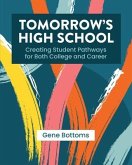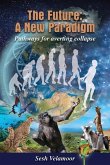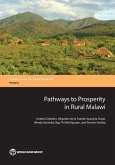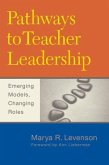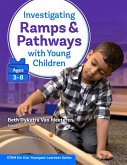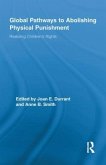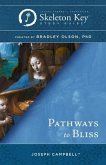Leyton Schnellert, Linda Watson, Nicole Widdess, Faye Brownlie
Creating Pathways for All Learners in the Middle Years
Schade – dieser Artikel ist leider ausverkauft. Sobald wir wissen, ob und wann der Artikel wieder verfügbar ist, informieren wir Sie an dieser Stelle.
Leyton Schnellert, Linda Watson, Nicole Widdess, Faye Brownlie
Creating Pathways for All Learners in the Middle Years
- Broschiertes Buch
- Merkliste
- Auf die Merkliste
- Bewerten Bewerten
- Teilen
- Produkt teilen
- Produkterinnerung
- Produkterinnerung
In this third volume of It's All About Thinking, the authors focus on teaching and learning in the middle years, transforming principles into practices, and exploring such questions as: How can we help students develop the competencies they need to become successful learners? How can we create pathways to deep learning of important concepts? How can we engage and support diverse learners in inclusive classrooms? Nicole, Linda, and Leyton explore these questions and offer classroom examples to help busy teachers develop communities where all students learn, focusing on the big ideas in middle years education today.…mehr
Andere Kunden interessierten sich auch für
![Tomorrow's High School Tomorrow's High School]() Gene BottomsTomorrow's High School33,99 €
Gene BottomsTomorrow's High School33,99 €![The Future The Future]() Sesh R VelamoorThe Future11,99 €
Sesh R VelamoorThe Future11,99 €![Pathways to Prosperity in Rural Malawi Pathways to Prosperity in Rural Malawi]() Andrew DabalenPathways to Prosperity in Rural Malawi36,99 €
Andrew DabalenPathways to Prosperity in Rural Malawi36,99 €![Pathways to Teacher Leadership Pathways to Teacher Leadership]() Marya R LevensonPathways to Teacher Leadership28,99 €
Marya R LevensonPathways to Teacher Leadership28,99 €![Investigating Ramps and Pathways with Young Children (Ages 3-8) Investigating Ramps and Pathways with Young Children (Ages 3-8)]() Investigating Ramps and Pathways with Young Children (Ages 3-8)38,99 €
Investigating Ramps and Pathways with Young Children (Ages 3-8)38,99 €![Global Pathways to Abolishing Physical Punishment Global Pathways to Abolishing Physical Punishment]() Global Pathways to Abolishing Physical Punishment73,99 €
Global Pathways to Abolishing Physical Punishment73,99 €![Pathways to Bliss Pathways to Bliss]() Bradley OlsonPathways to Bliss20,99 €
Bradley OlsonPathways to Bliss20,99 €
In this third volume of It's All About Thinking, the authors focus on teaching and learning in the middle years, transforming principles into practices, and exploring such questions as: How can we help students develop the competencies they need to become successful learners? How can we create pathways to deep learning of important concepts? How can we engage and support diverse learners in inclusive classrooms? Nicole, Linda, and Leyton explore these questions and offer classroom examples to help busy teachers develop communities where all students learn, focusing on the big ideas in middle years education today.
Produktdetails
- Produktdetails
- Verlag: Portage & Main Press
- Seitenzahl: 229
- Altersempfehlung: 5 bis 8 Jahre
- Erscheinungstermin: 9. Januar 2015
- Englisch
- Abmessung: 267mm x 203mm x 19mm
- Gewicht: 680g
- ISBN-13: 9781553795094
- ISBN-10: 1553795091
- Artikelnr.: 53920222
- Herstellerkennzeichnung
- Libri GmbH
- Europaallee 1
- 36244 Bad Hersfeld
- gpsr@libri.de
- Verlag: Portage & Main Press
- Seitenzahl: 229
- Altersempfehlung: 5 bis 8 Jahre
- Erscheinungstermin: 9. Januar 2015
- Englisch
- Abmessung: 267mm x 203mm x 19mm
- Gewicht: 680g
- ISBN-13: 9781553795094
- ISBN-10: 1553795091
- Artikelnr.: 53920222
- Herstellerkennzeichnung
- Libri GmbH
- Europaallee 1
- 36244 Bad Hersfeld
- gpsr@libri.de
Leyton Schnellert, PhD, (he/his/him) is an associate professor in UBC's Department of Curriculum & Pedagogy and Eleanor Rix Professor in Rural Teacher Education. He focuses on how teachers and teaching and learners and learning can mindfully embrace student diversity and inclusive education. Dr. Schnellert is the Pedagogy and Participation research cluster lead in UBC's Institute for Community Engaged Research, inclusive education research lead in the Canadian Institute for Inclusion and Citizenship, and co-chair of BC's Rural Education Advisory. His community-based collaborative work contributes a counter argument to top-down approaches that operate from deficit models, instead drawing from communities' funds of knowledge to build participatory, place-conscious, and culturally responsive practices. Leyton works and learns on the traditional, ancestral, and unceded territory of the Sinixt who were declared extinct by Canada's government in 1956 and stands in solidarity with the Sinixt in their reclamation efforts. Leyton has been a middle and secondary years classroom teacher and a learning resource teacher for grades K-12. His books, films, and research articles are widely referenced locally, nationally, and globally.
Table of Contents
1. Foreword xi
2. Chapter 1 Teaching and Learning in the Middle Years: Diversity as Strength
1
* Developing and Sharing Our Practice 2
* Middle Years Philosophy and Practice 2
* Identity Development in the Middle Years 8
* Conclusion 10
3. Chapter 2 Pathways to Professional Learning: Inquiry, Collaboration, and
Professional Reading 11
* All Teachers, All Subjects 13
* Working Together for All Learners 13
* A Collaborative Model of Support 16
* Collaborating to Teach Math to Combined Grades 18
* Lesson Study: A Powerful Approach to Teacher Teams 21
* Teacher Leaders as Facilitators and Co-Learners 24
* Conclusion 26
4. Chapter 3 Responsive Teaching: Connecting Assessment, Planning, and
Instruction 27
* (In)formative Assessment: Getting Started 28
* Using a Performance-Based Assessment to Guide
* Your Teaching 32
* Assessing Student Work 35
* The Cycle of Assessing, Planning, Teaching, and Assessing 38
* Planning to Use Formative Assessment Information 39
* From Assessment to Instruction 41
* Grouping Students for Optimal Learning 43
* Differentiation 51
* Conclusion 51
5. Chapter 4 Deep Learning: Integrating Content, Process, and Product 53
* The Curriculum We Need 54
* Including Students with Significant Learning Challenges 58
* Using Diverse Texts and Big Ideas to Enhance Student Engagement 68
* Information Circles Using Text Sets 75
* Conclusion 79
6. Chapter 5 Creating Pathways by Integrating the Arts 81
* Rationale for Integrating the Arts 82
* Drama as a Pathway 84
* Dance and Music as Pathways 91
* Visual Arts as a Pathway 97
* Conclusion 104
7. Chapter 6 Creating Pathways Using Inquiry and Project-Based Learning 105
* Project-Based Learning 106
* Lessons in Decoding Texts and Constructing Meaning 110
* Inquiry-Based Research 114
* Inquiry in a Differentiated Math Class 126
* Developing Powerful Questions in Humanities 131
* Deep Inquiry Learning: An Integrative Unit 136
* Conclusion 150
8. Chapter 7 Creating Pathways through Social-Emotional Learning 153
* Developing a Learning Community 154
* Integrating Social-Emotional Learning and
* Project-Based Learning 158
* Service Learning 167
* Challenge-Based Projects in Community Learning 172
* Effective Essential Questions and Challenge Statements 175
* Conclusion 180
9. Chapter 8 Creating Pathways to Self-Regulated Learning 181
* Helping Students Self-Regulate 182
* Building Criteria with Students 189
* Making Shakespeare Accessible 190
* Engaging Students as Critical Thinkers 195
* Numeracy Circles: Tackling Problems Together 197
* Conclusion 204
10. Chapter 9 Creating Pathways Using Diverse Texts 205
* What is a text? 206
* The Power of Text Sets 206
* First Nations Community-Generated Texts 209
* Information Texts: Synthesis and Inference 212
* Graphic Novels Expand Our Repertoire of Text 216
* Integrating Diverse Texts 227
* Stop Cyberbullying Unit 231
* Conclusion 236
11. Chapter 10 Creating Pathways through Writing 237
* The Pleasure of Writing 238
* Poetic Play Pays Off 239
* A Pathway into Personal Writing 243
* Writing Informational Texts through Inquiry 246
* Conclusion 259
12. Chapter 11 Creating Pathways through Technology and New Literacies 261
* Making the World a Better Place Together 263
* Musqueam Inquiry - Using iPads 269
* Creating Pathways with New Technologies 277
* Conclusion 288
13. References 289
14. Index of Frameworks, Approaches, or Strategies 297
1. Foreword xi
2. Chapter 1 Teaching and Learning in the Middle Years: Diversity as Strength
1
* Developing and Sharing Our Practice 2
* Middle Years Philosophy and Practice 2
* Identity Development in the Middle Years 8
* Conclusion 10
3. Chapter 2 Pathways to Professional Learning: Inquiry, Collaboration, and
Professional Reading 11
* All Teachers, All Subjects 13
* Working Together for All Learners 13
* A Collaborative Model of Support 16
* Collaborating to Teach Math to Combined Grades 18
* Lesson Study: A Powerful Approach to Teacher Teams 21
* Teacher Leaders as Facilitators and Co-Learners 24
* Conclusion 26
4. Chapter 3 Responsive Teaching: Connecting Assessment, Planning, and
Instruction 27
* (In)formative Assessment: Getting Started 28
* Using a Performance-Based Assessment to Guide
* Your Teaching 32
* Assessing Student Work 35
* The Cycle of Assessing, Planning, Teaching, and Assessing 38
* Planning to Use Formative Assessment Information 39
* From Assessment to Instruction 41
* Grouping Students for Optimal Learning 43
* Differentiation 51
* Conclusion 51
5. Chapter 4 Deep Learning: Integrating Content, Process, and Product 53
* The Curriculum We Need 54
* Including Students with Significant Learning Challenges 58
* Using Diverse Texts and Big Ideas to Enhance Student Engagement 68
* Information Circles Using Text Sets 75
* Conclusion 79
6. Chapter 5 Creating Pathways by Integrating the Arts 81
* Rationale for Integrating the Arts 82
* Drama as a Pathway 84
* Dance and Music as Pathways 91
* Visual Arts as a Pathway 97
* Conclusion 104
7. Chapter 6 Creating Pathways Using Inquiry and Project-Based Learning 105
* Project-Based Learning 106
* Lessons in Decoding Texts and Constructing Meaning 110
* Inquiry-Based Research 114
* Inquiry in a Differentiated Math Class 126
* Developing Powerful Questions in Humanities 131
* Deep Inquiry Learning: An Integrative Unit 136
* Conclusion 150
8. Chapter 7 Creating Pathways through Social-Emotional Learning 153
* Developing a Learning Community 154
* Integrating Social-Emotional Learning and
* Project-Based Learning 158
* Service Learning 167
* Challenge-Based Projects in Community Learning 172
* Effective Essential Questions and Challenge Statements 175
* Conclusion 180
9. Chapter 8 Creating Pathways to Self-Regulated Learning 181
* Helping Students Self-Regulate 182
* Building Criteria with Students 189
* Making Shakespeare Accessible 190
* Engaging Students as Critical Thinkers 195
* Numeracy Circles: Tackling Problems Together 197
* Conclusion 204
10. Chapter 9 Creating Pathways Using Diverse Texts 205
* What is a text? 206
* The Power of Text Sets 206
* First Nations Community-Generated Texts 209
* Information Texts: Synthesis and Inference 212
* Graphic Novels Expand Our Repertoire of Text 216
* Integrating Diverse Texts 227
* Stop Cyberbullying Unit 231
* Conclusion 236
11. Chapter 10 Creating Pathways through Writing 237
* The Pleasure of Writing 238
* Poetic Play Pays Off 239
* A Pathway into Personal Writing 243
* Writing Informational Texts through Inquiry 246
* Conclusion 259
12. Chapter 11 Creating Pathways through Technology and New Literacies 261
* Making the World a Better Place Together 263
* Musqueam Inquiry - Using iPads 269
* Creating Pathways with New Technologies 277
* Conclusion 288
13. References 289
14. Index of Frameworks, Approaches, or Strategies 297
Table of Contents
1. Foreword xi
2. Chapter 1 Teaching and Learning in the Middle Years: Diversity as Strength
1
* Developing and Sharing Our Practice 2
* Middle Years Philosophy and Practice 2
* Identity Development in the Middle Years 8
* Conclusion 10
3. Chapter 2 Pathways to Professional Learning: Inquiry, Collaboration, and
Professional Reading 11
* All Teachers, All Subjects 13
* Working Together for All Learners 13
* A Collaborative Model of Support 16
* Collaborating to Teach Math to Combined Grades 18
* Lesson Study: A Powerful Approach to Teacher Teams 21
* Teacher Leaders as Facilitators and Co-Learners 24
* Conclusion 26
4. Chapter 3 Responsive Teaching: Connecting Assessment, Planning, and
Instruction 27
* (In)formative Assessment: Getting Started 28
* Using a Performance-Based Assessment to Guide
* Your Teaching 32
* Assessing Student Work 35
* The Cycle of Assessing, Planning, Teaching, and Assessing 38
* Planning to Use Formative Assessment Information 39
* From Assessment to Instruction 41
* Grouping Students for Optimal Learning 43
* Differentiation 51
* Conclusion 51
5. Chapter 4 Deep Learning: Integrating Content, Process, and Product 53
* The Curriculum We Need 54
* Including Students with Significant Learning Challenges 58
* Using Diverse Texts and Big Ideas to Enhance Student Engagement 68
* Information Circles Using Text Sets 75
* Conclusion 79
6. Chapter 5 Creating Pathways by Integrating the Arts 81
* Rationale for Integrating the Arts 82
* Drama as a Pathway 84
* Dance and Music as Pathways 91
* Visual Arts as a Pathway 97
* Conclusion 104
7. Chapter 6 Creating Pathways Using Inquiry and Project-Based Learning 105
* Project-Based Learning 106
* Lessons in Decoding Texts and Constructing Meaning 110
* Inquiry-Based Research 114
* Inquiry in a Differentiated Math Class 126
* Developing Powerful Questions in Humanities 131
* Deep Inquiry Learning: An Integrative Unit 136
* Conclusion 150
8. Chapter 7 Creating Pathways through Social-Emotional Learning 153
* Developing a Learning Community 154
* Integrating Social-Emotional Learning and
* Project-Based Learning 158
* Service Learning 167
* Challenge-Based Projects in Community Learning 172
* Effective Essential Questions and Challenge Statements 175
* Conclusion 180
9. Chapter 8 Creating Pathways to Self-Regulated Learning 181
* Helping Students Self-Regulate 182
* Building Criteria with Students 189
* Making Shakespeare Accessible 190
* Engaging Students as Critical Thinkers 195
* Numeracy Circles: Tackling Problems Together 197
* Conclusion 204
10. Chapter 9 Creating Pathways Using Diverse Texts 205
* What is a text? 206
* The Power of Text Sets 206
* First Nations Community-Generated Texts 209
* Information Texts: Synthesis and Inference 212
* Graphic Novels Expand Our Repertoire of Text 216
* Integrating Diverse Texts 227
* Stop Cyberbullying Unit 231
* Conclusion 236
11. Chapter 10 Creating Pathways through Writing 237
* The Pleasure of Writing 238
* Poetic Play Pays Off 239
* A Pathway into Personal Writing 243
* Writing Informational Texts through Inquiry 246
* Conclusion 259
12. Chapter 11 Creating Pathways through Technology and New Literacies 261
* Making the World a Better Place Together 263
* Musqueam Inquiry - Using iPads 269
* Creating Pathways with New Technologies 277
* Conclusion 288
13. References 289
14. Index of Frameworks, Approaches, or Strategies 297
1. Foreword xi
2. Chapter 1 Teaching and Learning in the Middle Years: Diversity as Strength
1
* Developing and Sharing Our Practice 2
* Middle Years Philosophy and Practice 2
* Identity Development in the Middle Years 8
* Conclusion 10
3. Chapter 2 Pathways to Professional Learning: Inquiry, Collaboration, and
Professional Reading 11
* All Teachers, All Subjects 13
* Working Together for All Learners 13
* A Collaborative Model of Support 16
* Collaborating to Teach Math to Combined Grades 18
* Lesson Study: A Powerful Approach to Teacher Teams 21
* Teacher Leaders as Facilitators and Co-Learners 24
* Conclusion 26
4. Chapter 3 Responsive Teaching: Connecting Assessment, Planning, and
Instruction 27
* (In)formative Assessment: Getting Started 28
* Using a Performance-Based Assessment to Guide
* Your Teaching 32
* Assessing Student Work 35
* The Cycle of Assessing, Planning, Teaching, and Assessing 38
* Planning to Use Formative Assessment Information 39
* From Assessment to Instruction 41
* Grouping Students for Optimal Learning 43
* Differentiation 51
* Conclusion 51
5. Chapter 4 Deep Learning: Integrating Content, Process, and Product 53
* The Curriculum We Need 54
* Including Students with Significant Learning Challenges 58
* Using Diverse Texts and Big Ideas to Enhance Student Engagement 68
* Information Circles Using Text Sets 75
* Conclusion 79
6. Chapter 5 Creating Pathways by Integrating the Arts 81
* Rationale for Integrating the Arts 82
* Drama as a Pathway 84
* Dance and Music as Pathways 91
* Visual Arts as a Pathway 97
* Conclusion 104
7. Chapter 6 Creating Pathways Using Inquiry and Project-Based Learning 105
* Project-Based Learning 106
* Lessons in Decoding Texts and Constructing Meaning 110
* Inquiry-Based Research 114
* Inquiry in a Differentiated Math Class 126
* Developing Powerful Questions in Humanities 131
* Deep Inquiry Learning: An Integrative Unit 136
* Conclusion 150
8. Chapter 7 Creating Pathways through Social-Emotional Learning 153
* Developing a Learning Community 154
* Integrating Social-Emotional Learning and
* Project-Based Learning 158
* Service Learning 167
* Challenge-Based Projects in Community Learning 172
* Effective Essential Questions and Challenge Statements 175
* Conclusion 180
9. Chapter 8 Creating Pathways to Self-Regulated Learning 181
* Helping Students Self-Regulate 182
* Building Criteria with Students 189
* Making Shakespeare Accessible 190
* Engaging Students as Critical Thinkers 195
* Numeracy Circles: Tackling Problems Together 197
* Conclusion 204
10. Chapter 9 Creating Pathways Using Diverse Texts 205
* What is a text? 206
* The Power of Text Sets 206
* First Nations Community-Generated Texts 209
* Information Texts: Synthesis and Inference 212
* Graphic Novels Expand Our Repertoire of Text 216
* Integrating Diverse Texts 227
* Stop Cyberbullying Unit 231
* Conclusion 236
11. Chapter 10 Creating Pathways through Writing 237
* The Pleasure of Writing 238
* Poetic Play Pays Off 239
* A Pathway into Personal Writing 243
* Writing Informational Texts through Inquiry 246
* Conclusion 259
12. Chapter 11 Creating Pathways through Technology and New Literacies 261
* Making the World a Better Place Together 263
* Musqueam Inquiry - Using iPads 269
* Creating Pathways with New Technologies 277
* Conclusion 288
13. References 289
14. Index of Frameworks, Approaches, or Strategies 297


